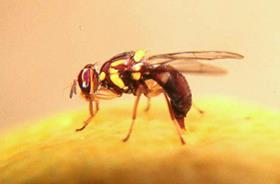
New Zealand’s fresh produce industry is on high biosecurity alert, following the discovery of a singular male Queensland fruit fly in the country’s north island. The fly was collected from a surveillance trap set in a residential street in Whangarei on Tuesday.
The find has sparked a large-scale reaction from New Zealand quarantine officials, with the Ministry for Primary Industries (MPI) stationing close to 50 officers in the northern city to determine if an infestation has arisen.
“It is vital to find out if the insect is a solitary find or if there is a wider population in Whangarei,” MPI deputy director general compliance and response Andrew Coleman said.
“This insect is an unwanted and notifiable organism that could have serious consequences for New Zealand’s horticultural industry. It can damage a wide range of fruit and vegetables.”
Coleman said New Zealand’s horticultural trading partners had been notified of the discovery. He anticipated foreign markets would accept it as a stand-alone case if no other traces of fruit fly were found over the next two weeks.
Kerikeri Fruitgrowers' Association chairman Rick Curtis told the New Zealand Herald growers in his area were 'nervous as hell.'
The MPI stressed it has strict import requirements in place to minimise this risk of fruit fly outbreaks.“All plant material and fruit that can host the Queensland fruit fly can only be imported to New Zealand under the requirements of the relevant Import Health Standard,” the MPI said in a statement.
These standards define approved pre-export treatment systems to manage the risk of fruit fly and other pests from entering, while air and sea passengers are prohibited from bringing fresh fruit and vegetables into the country.
Despite such measures, this week’s Whangarei find is not the first reported detection of the Queensland Fruit Fly in New Zealand.The pest, native to Australia, was discovered in Whangarei in 1995 and in Auckland in 1996 and 2012.
“In all cases increased surveillance found no further sign of Queensland fruit fly,” Coleman said.



